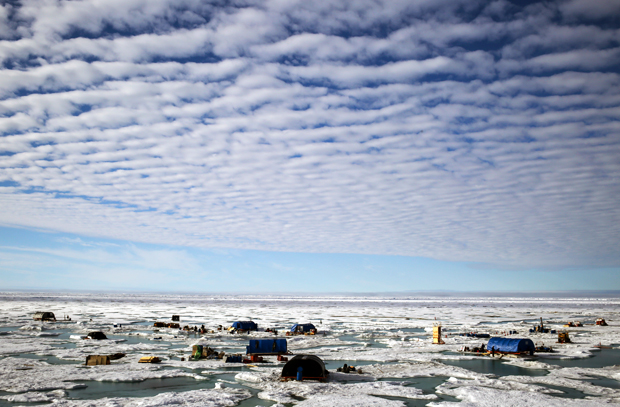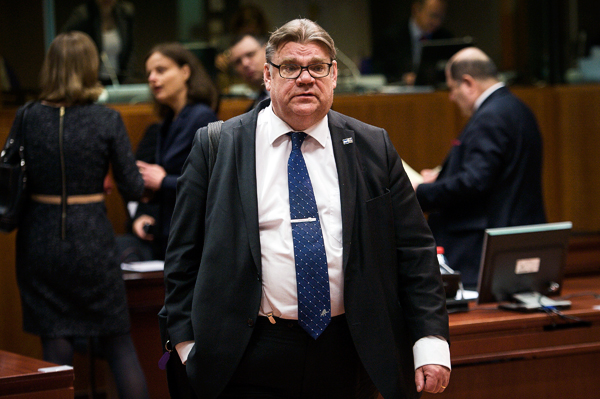Новости – Digest












Digest
Arctic Future: Finland Pleads, Russia Insists

Russian drifting ice station “North Pole – 2015”. Photo by: Artyom Geodakyan/TASS
The Head of the Finnish Ministry for Foreign Affairs appealed to the global community to revise the status of the Arctic in international law
8 февраля, 2016 14:00
3 мин
During a conference at the Center for Strategic and International Studies in Washington, the Finnish Minister for Foreign Affairs Timo Soini made a statement that can be considered worrisome by the Russian authorities.
In his opinion, existing international norms that regulate navigation, fishing industry and environmental protection in the Arctic demand certain corrections. The need for change is explained by a number of objective factors, among which the most significant are ecology and politics. Specifically, Mr. Soini drew attention to global warming that is expected to melt the ice covers the Arctic Ocean and open new routes for travel and trade.
According to international agreements, there are only eight states that have the exclusive right to navigate Arctic seas – Russia, Finland, Sweden, USA, Norway, Canada, Denmark and Iceland. The Finnish Minister for Foreign Affairs assumed that the Arctic states may have to share these cold waters with other countries that will need to use Northern seaways for the sake of global trade in the future.
Mr. Soini believes that the “ever changing” economic landscape of the Arctic opens for new opportunities for international companies and corporations in this region. The current agreements on use of the Arctic territories do not correlate with the intentions of some advocates of economic expansion. The Finnish minister suggests that these agreements should be examined and, if need be, adjusted to the requirements of the times.
Not just words
Timo Soini is a person of high political status, so his statements are not to be neglected as idle talk. Moreover, the conference where he presented his controversial report took place in the legendary, if notorious, Center for Strategic and International Studies in Washington.
This institution was founded in 1962 as a structural department of the Central Intelligence Agency of the USA. For many years, the Center had been developing under the patronage of Henry Kissinger and Zbigniew Brzezinski, the two ideologists of the Cold War. The CSIS was the anvil on which military advisors for Ronald Reagan were forged. It is not a coincidence, but an alarming sign, that the Center gives tribune to a foreign statesman who voices ideas which threaten the economic and political interests of the Russian Federation.
The Finnish diplomat, as if encouraged by the very spirit of the CSIS, was speaking in defense of the Arctic region from Russian influence. Of course, the protocol would not allow Timo Soini to express himself so directly, which is why he proceeded from the overall situation in global politics and security, described by him as volatile. However, he added that there is increasing tension between the Russian Federation and Western countries. In Soini’s opinion, Moscow bears responsibility for this state of affairs after “use of military force in Ukraine” and “annexation of Crimea”.
It is obvious that this digression should be regarded in the context of the discussion on revising international agreements on the Arctic. Timo Soini himself made it clear that existing security issues would have imminent influence on situation in the Arctic.

Тимо Сойни
Timo Soini. Photo by: Wiktor Dabkowski / Zuma / TASS
Soini sees that the Arctic states pay more and more attention to security policy and military presence in the High North. In his vision, the Arctic of today is a quiet region with low probability of armed confrontation. However, Soini is worried by increasing presence of Russian military forces in the Northern territories. At the conference, he was trying to convey his anxiety to Finland’s international friends, and urge them to “cooperate in case Moscow misbehaved”.
Certainly, the Finnish Minister for Foreign Affairs could not - and did not - forget to mention that Russia had in recent years demonstrated openness for cooperation in all spheres related to the Arctic. Particularly, he praised Moscow for readiness to participate in the Barents Euro-Arctic Council and in a partnership program “Northern Dimension”.
On the second look, Timo Soini’s attempts to examine situation in the Arctic are just diplomatic decorations for a plea of protection. Finland, being out of NATO, obviously feels vulnerable bordering a country that, on one hand, is open and compassionate, but on the other hand, invokes associations with conflict and friction.
There are indeed domestic debates on the possible entry of Finland in the structure of NATO. This country has always positioned itself as equidistant from any military alliances, but it also has made exception for NATO since 1993 when Finland participated for the first time in non-military maneuvers in the Baltic Sea. Nowadays, Finland enjoys (perhaps literally) observer status in NATO. Nevertheless, in April, 2014 the Finnish Prime Minister Jyrki Katainen stated that it was necessary for his country to join the Western alliance.
Rules shall remain intact
The position of Russia on international law in the Arctic seems to be impenetrable. From time to time, Russian “colleagues” in this region make efforts to revise previous agreements, but to no result. However, the negative scenario is not to be neglected, as Finland could really join NATO in the future and, in the end, push its vision of the Arctic with more intensity.
“There is no guarantee that this scenario will never come true,” says political scientist Andrei Kovalenko in his commentary to Russian Planet. “We can predict that there will be further attempts to make the Arctic more favorable for states with plans for economic exploitation of the region’s riches. We have to minimize the risk of such a scenario, so we are interested in preservation of the status quo in the Arctic. We must also continue to increase our presence in the Northern seas, meaning, first of all, the navy and icebreakers, which Russia has most of all other countries”
Thus, Russia intends to hold on to this strategically important region and resist attempts to revise previous agreements that solidify spheres of influence in the Arctic. Still, what of Finland’s delicately expressed intentions to expedite the process of joining NATO?
In the course of history, Finland had joined various alliances, most of which were against Russia. Perhaps, the Finnish authorities should be reminded – of course, delicately – how their last alignment with anti-Russian power worked out seventy years ago.
поддержать проект
Подпишитесь на «Русскую Планету» в Яндекс.Новостях

Яндекс.Новости



















